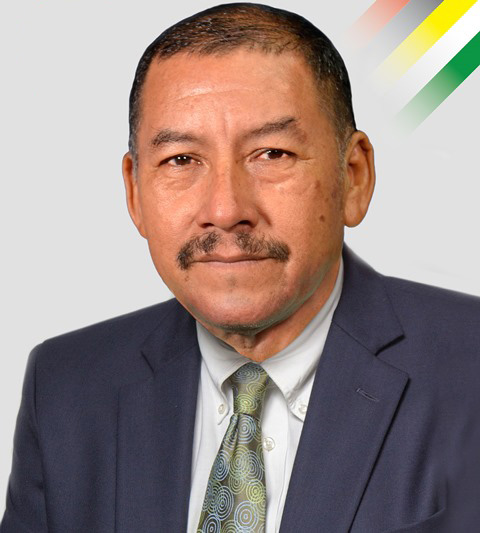Vice President and Minister of Indigenous People’s Affairs, Sydney Allicock, who is currently performing the duties of Prime Minister, is doing so illegally as he is not an elected member of government, former Attorney General Anil Nandlall has argued.
“A person cannot be appointed to act in an office if he is not qualified to be appointed to that office. Therefore, Sydney Allicock is unlawfully and unconstitutionally acting as Prime Minister,” Nandlall said yesterday.
“Sydney Allicock was on the geographic list of the APNU+AFC for Region 9 for the 2015 General and Regional Elections. He lost that seat. Article 101 (1) of the Constitution provides that the Prime Minister must be an elected member of the National Assembly. Sydney Allicock was appointed a technocratic Minister under Article 103 (3) of the Constitution. He therefore, sits in the National Assembly by virtue of that ministerial appointment under Article 105 of the Constitution,” he said.
Back in 2010, under the PPP/C government, the issue of a technocrat acting as Prime Minister was raised by attorney Christopher Ram.
The then PPP/C government had rejected the assertion that the appointment of then Finance Minister Ashni Singh as the acting Prime Minister was unconstitutional. Singh was a technocrat minister. The Office of the President had reacted saying that “the appointment was well considered and is within the ambit of the Constitution of Guyana.”
Allicock was on Friday sworn in by Acting President Moses Nagamootoo to perform the duties of Prime Minister since Acting Prime Minister and Minister of Public Security Khemraj Ramjattan is out of the country on work duty.
Nagamootoo has been performing the functions of President and Ramjattan, Prime Minister, since President David Granger left on April 2nd for Cuba to continue treatment for Non-Hodgkin Lymphoma.
Granger is scheduled to return to Guyana this week.
Nandlall said that the decision to have Allicock, who was appointed as a technocrat minister in 2015, to act as Prime Minister, is a flawed one and contradicts Guyana’s Constitution.
He explained that the PPP won Region 9 at the 2015 General Elections and they have their chosen candidate in Parliament. Although government lost the region and consequently, Allicock lost, he was nonetheless appointed by the president as a minister as provided for by Article 103(3) and sits in the National Assembly by virtue of Article 105.
According to Article 101(1) of the Constitution, “The President shall appoint an elected member of the National Assembly to be Prime Minister of Guyana: Provided that a person who is not eligible to be elected as President shall not be eligible for appointment as Prime Minister.
(2) The Prime Minister shall be the principal assistant of the President in the discharge of his or her executive functions and leader of Government business in the National Assembly.”
Article 103 (1) states that, “The Prime Minister and every other Vice President shall be a minister of the government of Guyana.”
Article 103 (2) provides that “Subject to the Provisions of Article 101(1), Vice Presidents and other Ministers shall be appointed by the President from among persons who are elected members of the National Assembly or subject to subparagraph (VII of Paragraph (3)(a) of Article 160) are qualified to be elected as such members.
“Not more than four Ministers and two Parliamentary Secretaries shall be appointed by the President from among persons who are qualified to be elected as members of the National Assembly,” Article 103(3) states.
“He was a geographic candidate who lost his seat. That means he was not elected by his own constituency in which he vied for election. However, by virtue of his appointment as a minister, he was able to sit in the National Assembly by virtue of Article 105 of the Constitution, which mandates all ministers to be Members of Parliament. The rationale being that one cannot be a minister and not answerable to the people’s representative in the parliament,” Nandlall said.
The former Attorney General stressed that the framers of this country’s Constitution went to the lengths of explaining that Article 103(2) was subject to Article 101 (1) which he said, “clearly mandates the Prime Minister to be an elected member of the National Assembly.”
“In my view, the rationale for requiring the Prime Minister or anyone functioning in that office to be an elected official is because that person is the first Vice President and the most likely person to act in the office of the president, in the absence of the president himself. Because it is inconceivable for a person to act as president who is (not) elected by the people,” he reasoned.
Nandlall said that he has read views expressed by Minister of State Joseph Harmon that Allicock was not illegal and if it comes to the issue of his voting in parliament, it will be dealt with there. “The view expressed by Minister of State Joseph Harmon is an absolute non-sequitur. Unfortunately, he ignores the fact that the Constitution is the document that determines who is qualified to hold constitutional offices and the Office of the Prime Minister is an office created by the Constitution and the Constitution stipulates the qualification of that office. If you do not meet those qualifications, you cannot act in or be appointed to that office,” he said.
“Another rationale is he is the Leader of Government’s Business and the Constitution makes that very clear. It is inconceivable that the Leader of Government’s Business will not have a right to vote in the National Assembly,” he added.





